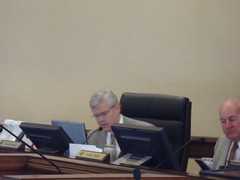Update 8 December 2012: Actually,
Houston County does have enforceable encroachment zones around RAFB.
Houston County hasn’t had a enforceable encroachment zone around
Warner Robins Air Force Base (RAFB) and is now fixing the problem
after the fact by using state money to buy up houses near the base.
 Houston County Commission Chairman Tommy Stalnaker labelled encroachment
his number one priority, in stark contrast to Lowndes County Commission
Chairman Ashley Paulk, who has put
two items on the agenda for Monday and Tuesday
related to a proposed rezoning next to Moody Air Force Base,
and already at a previous Work Session
invited the developer to speak
without letting anyone else speak.
Houston County Commission Chairman Tommy Stalnaker labelled encroachment
his number one priority, in stark contrast to Lowndes County Commission
Chairman Ashley Paulk, who has put
two items on the agenda for Monday and Tuesday
related to a proposed rezoning next to Moody Air Force Base,
and already at a previous Work Session
invited the developer to speak
without letting anyone else speak.
Gene Rector wrote for WRWR “10 months ago”,
Stalnaker ‘ecstatic’ over state action on Robins encroachment issue,
In a word, Houston County Commission Chairman Tommy Stalnaker was
“ecstatic” last week when he learned state officials
 will allocate $7.5 million to help resolve the encroachment issue
affecting Robins Air Force Base.
will allocate $7.5 million to help resolve the encroachment issue
affecting Robins Air Force Base.
State Rep. Larry O’Neal called and gave him a heads-up before Gov.
Nathan Deal made the announcement on Friday.
“I felt like jumping up and down and screaming and
hollering,” Stalnaker admitted. “But then I remembered
we hadn’t done our part yet.”
Encroachment has dogged Robins for a number of years. Some 250
parcels — mostly private residences — spread over 1,600
acres in south Bibb and north Houston counties fall within the
base’s noise or potential mishap zone.
That risk to homes in the designated region could restrict or limit
current operations or force the Air Force to look elsewhere for
future workload and mission growth.
Stalnaker has labeled resolving encroachment his number one
priority.
Mike Stucka wrote for the Telegraph 31 May 2012,
Interactive map: Robins AFB encroachment and property purchases,
Continue reading →
“This is a ‘thank you’ for the voters,” said Houston County Chairman Tommy Stalnaker as Warner Robins Councilman Paul Shealy presented the black and white sign. “They are the real victors of this thing tonight.”…










